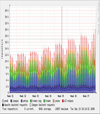On Monday, I participated in a Panel Discussion “Technology Trends” organized by CSI Pune at MIT college. The panelists were Anand Deshpande, CEO of Persistent Systems, Shridhar Shukla, MD of GS Lab, Monish Darda, GM of BladeLogic India (which is now a part of BMC Software), and me.
Anand asked each of us to prepare a list of 5 technology trends that we felt would be important in the year 2015, and then we would compare and contrast our lists. I’ve already published my own list of 5 things for students to focus on last week. Basically I cheated by listing a just a couple of technology trends, and filled out the list with one technology non-trend, and a couple of non-technology non-trends.
Here are my quick-n-dirty notes of the other panelists tech trends, and other points that came up during the discussion.
Here is Shridhar’s list:
- Shridhar’s trend #1: Immersive environments for consumers – from games to education. Partial virtual reality. We will have more audio, video, multi-media, and more interactivity. Use of keyboards and menu driven interfaces will reduce. Tip for students based on trend #1: don’t look down on GUIs. On a related note, sadly, none of the students had heard of TED. Shridhar asked them all to go and google it and to checking out “The Sixth Sense” TED video.
- Shridhar’s trend #2: totally integrated communication and information dissemination.
- Shridhar’s trend #3: Cloud computing, elastic computing. Computing on demand.
- Shridhar’s trend #4: Analytics. Analytics for business, for government, for corporates. Analyzing data, trends. Mining databases.
- Shridhar’s trend #5: Sophisticated design and test environments. As clouds gain prominence, large server farms with hundreds of thousands of servers will become common. As analytics become necessary, really complicated, distributed processes will run to do the complex computations. All of this will require very sophisticated environments, management tools and testing infrastructure. Hardcore computer science students are the ones who will be required to design, build and maintain this.
Monish’s list:
- Monish’s trend #1: Infrastructure will be commoditized, and interface to the final user will assume increasing importance
- Monish’s trend #2: Coming up with ideas – for things people use, will be most important. Actually developing the software will be trivial. Already, things like AWS makes a very sophisticated server farm available to anybody. And lots of open source software makes really complex software easy to put together. Hence, building the software is no longer the challenge. Thinking of what to build will be the more difficult task.
- Monish’s trend #3: Ideas combining multiple fields will rule. Use of technology in other areas (e.g. music) will increase. So far, software industry was driven by the needs of the software industry first, and then other “enterprise” industries (like banking, finance). But software will cross over into more and more mainstream uses. Be ready for the convergence, and meeting of the domains.
- Monish’s trend #4: Sophisticated management of centralized, huge infrastructure setups.
 Anand’s list:
Anand’s list:
- Anand’s trend #1: Sensors. Ubiquitous tiny computing devices that don’t even look like computers. All networked. And
- Anand trend #2: The next billion users. Mobile. New devices. New interfaces. Non-English interfaces. In fact, non-text interfaces.
- Anand’s trend #3: Analytics. Sophisticated processing of large amounts of data, and making sense out of the mess.
- Anand’s trend #4: User interface design. New interfaces, non-text, non-keyboard interfaces. For the next billion users.
- Anand’s trend #5: Multi-disciplinary products. Many different sciences intersecting with technology to produce interesting new products.
These lists of 5 trends had been prepared independently, without any collaboration. So it is interesting to note the commonalities. Usability. Sophisticated data analysis. Sophisticated management of huge infrastructure setups. The next billion users. And combining different disciplines. Thinking about these commonalities and then wondering about how to position ourselves to take advantage of these trends will form the topic of another post, another day.
Until then, here are some random observations. (Note: one of the speakers before the panel discussion was Deepak Shikarpur, and some of these observations are by him)
- “In the world of Google, memory has no value” – Deepak
- “Our students are in the 21st century. Teachers are from 20th century. And governance is 19th century” -Deepak
- “Earning crores of rupees is your birthright, and you can have it.” – Deepak
- Sad. Monish asked how many students had read Isaac Asimov. There were just a couple
- Monish encouraged students to go and read about string theory.
![Reblog this post [with Zemanta]](http://img.zemanta.com/reblog_b.png?x-id=230622cb-fbb0-4aad-a96a-ae8902c427cb)
![Reblog this post [with Zemanta]](http://img.zemanta.com/reblog_b.png?x-id=e1749b78-132c-4366-bb46-cab4ca90c763)

![Reblog this post [with Zemanta]](http://img.zemanta.com/reblog_b.png?x-id=089cfa90-e258-411d-bf44-99a5ff0e30f7)

![Reblog this post [with Zemanta]](http://img.zemanta.com/reblog_b.png?x-id=ec46f5f8-a253-4109-8de6-badf7272cc4a)
